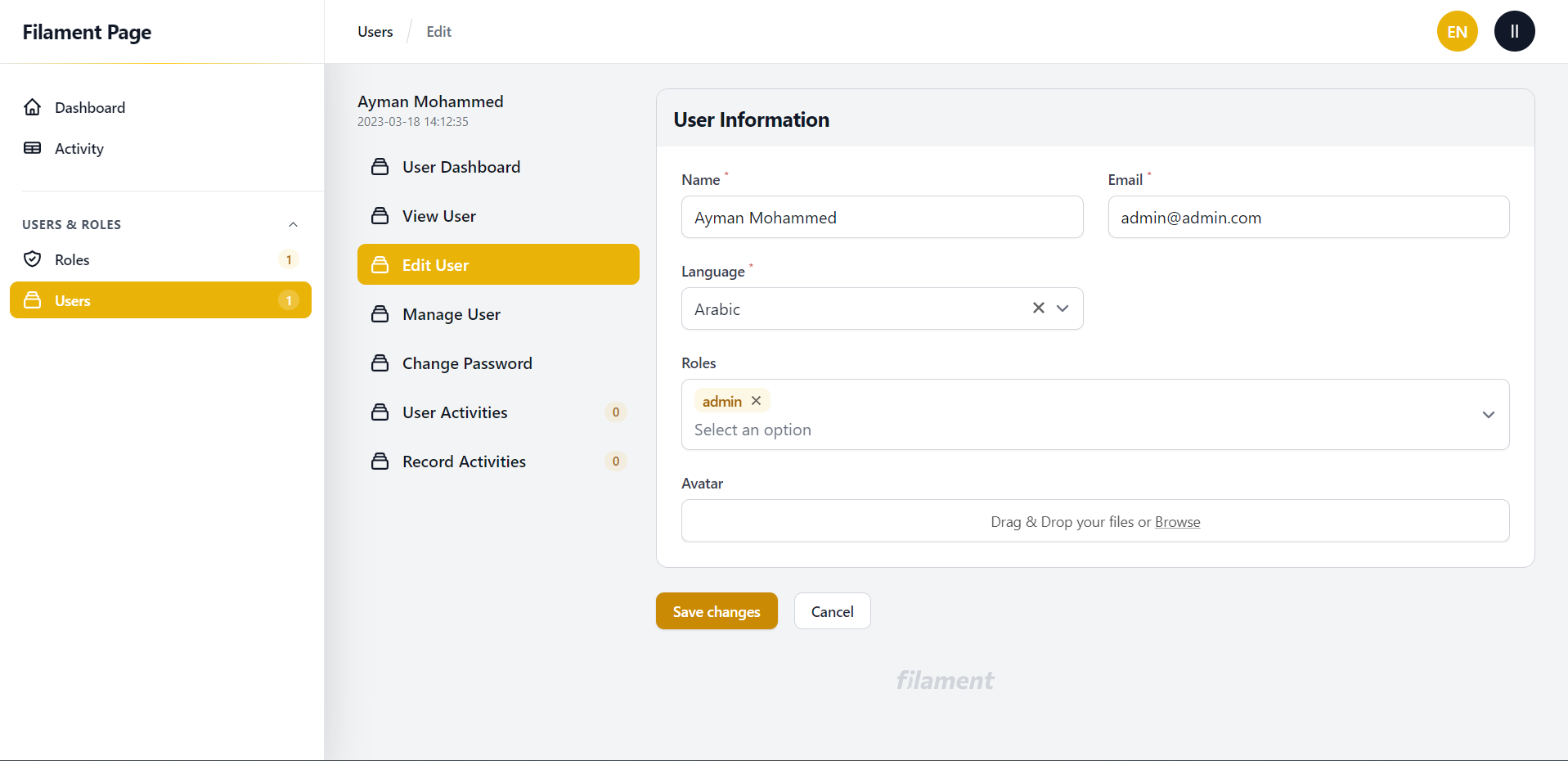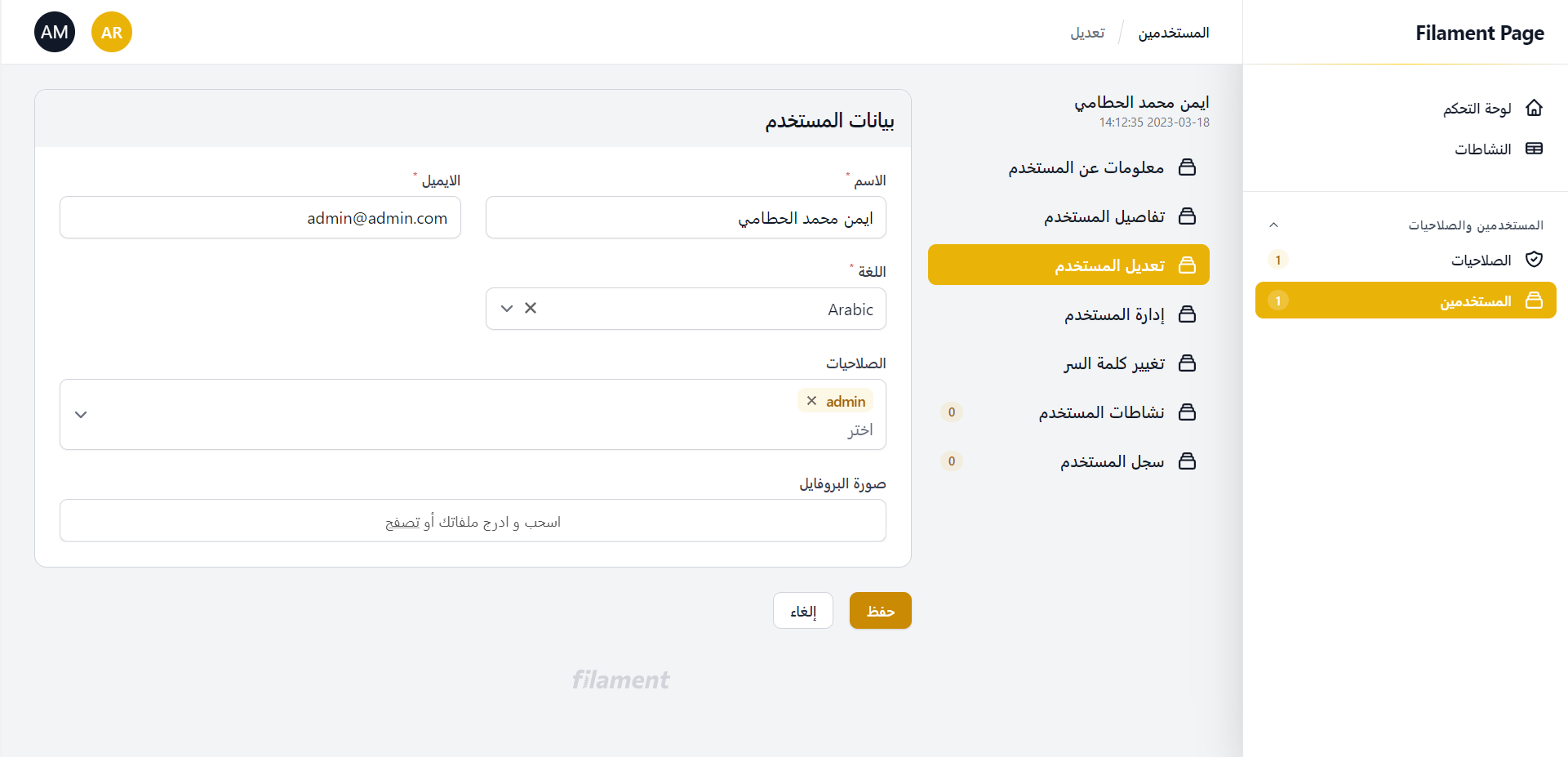Organize resource pages in sidebar in order to make navigation between resource pages more confort
This package only for Filament Admin Panel
$ composer require aymanalhattami/filament-page-with-sidebar- First you need to prepare resource pages, for example we have edit page, view page, manage page, change password page and dashboar page for UserResource
use Filament\Resources\Resource;
class UserResource extends Resource
{
// ...
public static function getPages(): array
{
return [
'index' => App\Filament\Resources\UserResource\Pages\ListUsers::route('/'),
'edit' => App\Filament\Resources\UserResource\Pages\EditUser::route('/{record}/edit'),
'view' => App\Filament\Resources\UserResource\Pages\ViewUser::route('/{record}/view'),
'manage' => App\Filament\Resources\UserResource\Pages\ManageUser::route('/{record}/manage'),
'password.change' => App\Filament\Resources\UserResource\Pages\ChangePasswordUser::route('/{record}/password/change'),
'dashboard' => App\Filament\Resources\UserResource\Pages\DashboardUser::route('/{record}/dashboard'),
// ... more pages
];
}
// ...
}- You should define record property in each page, example
use App\Models\User;
use Filament\Resources\Pages\Page;
use App\Filament\Resources\UserResource;
class ChangePasswordUser extends Page
{
// ...
protected static string $resource = UserResource::class;
protected static string $view = 'filament.resources.user-resource.pages.change-password-user';
public function mount($record)
{
$this->record = User::find($record);
}
// ...
}- Then, define sidebar method as static in the resource
use Illuminate\Database\Eloquent\Model;
use Filament\Resources\Resource;
use AymanAlhattami\FilamentPageWithSidebar\FilamentPageSidebar;
use AymanAlhattami\FilamentPageWithSidebar\PageNavigationItem;
class UserResource extends Resource
{
// ....
public static function sidebar(Model $record): FilamentPageSidebar
{
return FilamentPageSidebar::make()
->setNavigationItems([
PageNavigationItem::make('User Dashboard')
->url(function () use ($record) {
return static::getUrl('dashboard', ['record' => $record->id]);
}),
PageNavigationItem::make('View User')
->url(function () use ($record) {
return static::getUrl('view', ['record' => $record->id]);
}),
PageNavigationItem::make('Edit User')
->url(function () use ($record) {
return static::getUrl('edit', ['record' => $record->id]);
}),
PageNavigationItem::make('Manage User')
->url(function () use ($record) {
return static::getUrl('manage', ['record' => $record->id]);
}),
PageNavigationItem::make('Change Password')
->url(function () use ($record) {
return static::getUrl('password.change', ['record' => $record->id]);
}),
// ... more items
]);
}
// ....
}- Use x-filament-page-with-sidebar::page component in page blade file as wrapper for the whole content
// filament.resources.user-resource.pages.change-password-user
<x-filament-page-with-sidebar::page>
// ... page content
</x-filament-page-with-sidebar::page>You can set title or description by using setTitle and setDescription methods for the sidebar that will at the begaining of sidebar on the top, example
// ...
public static function sidebar(Model $record): FilamentPageSidebar
{
return FilamentPageSidebar::make()
->setTitle('Sidebar title')
->setDescription('Sidebar description')
->setNavigationItems([
PageNavigationItem::make(__('User Dashboard'))
->url(function () use ($record) {
return static::getUrl('dashboard', ['record' => $record->id]);
}),
PageNavigationItem::make(__('View User'))
->url(function () use ($record) {
return static::getUrl('view', ['record' => $record->id]);
}),
// ... more items
]);
}
// ...You can add icon to the item by using icon method, example
// ...
public static function sidebar(Model $record): FilamentPageSidebar
{
return FilamentPageSidebar::make()
->setNavigationItems([
PageNavigationItem::make('Change Password')
->url(function () use ($record) {
return static::getUrl('password.change', ['record' => $record->id]);
})->icon('heroicon-o-collection')
// ... more items
]);
}
// ...You can make item active "has different background color" by using isActiveWhen method, example
// ...
public static function sidebar(Model $record): FilamentPageSidebar
{
return FilamentPageSidebar::make()
->setNavigationItems([
PageNavigationItem::make('Change Password')
->url(function () use ($record) {
return static::getUrl('password.change', ['record' => $record->id]);
})
->isActiveWhen(function () {
return request()->route()->action['as'] == 'filament.resources.users.password.change';
})
// ... more items
]);
}
// ...You can hide item from sidebar by using isHiddenWhen method, example
// ...
public static function sidebar(Model $record): FilamentPageSidebar
{
return FilamentPageSidebar::make()
->setNavigationItems([
PageNavigationItem::make('Change Password')
->url(function () use ($record) {
return static::getUrl('password.change', ['record' => $record->id]);
})
->isHiddenWhen(false)
// ... more items
]);
}
,
// ...You can add badge to the item by using badge method, example
// ...
public static function sidebar(Model $record): FilamentPageSidebar
{
return FilamentPageSidebar::make()
->setNavigationItems([
PageNavigationItem::make('Change Password')
->url(function () use ($record) {
return static::getUrl('password.change', ['record' => $record->id]);
})
->badge("badge name")
// ... more items
]);
}
,
// ...Project Demo Link https://github.com/aymanalhattami/filament-page-with-sidebar-project

